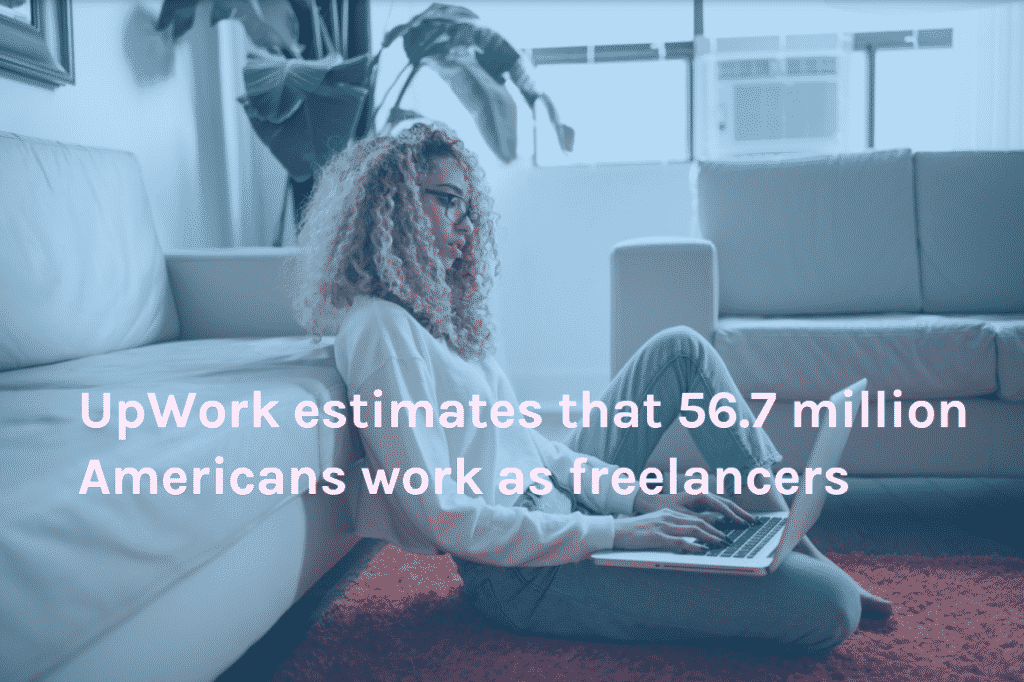There’s no denying that being a freelancer comes with some serious perks. You get to make your own schedule, only take on the projects that you want, and basically be your own boss. On top of that, with more and more tools and sites available to help freelancers succeed, making a career out of your side-hustle has never been easier — and this trend promises to continue. In fact, UpWork and the Freelancers’ Union estimated that there are nearly 57 million freelancers in the US.
Being financially savvy is especially important for freelancers, though. That’s because pay can be inconsistent, job security is lower than at a traditional 9 to 5, and there’s no company-sponsored retirement account. In this post, we will cover the most important financial success tips that every freelancer should be aware of. Let’s get started.

Budget to build up your savings
This is great advice for everyone, but it’s crucial for freelancers especially. That’s because you can never be too certain that you’ll have consistent work from month to month. Sure, some months might bring you a huge new set of orders — but other months, you might be left high and dry. That means having substantial savings will be crucial for those months that you aren’t quite sure where your next paycheck will come from.
When you do have an awesome month, and you rake in tons of cash you weren’t expecting, it’s a good idea to take a few minutes to think before you splurge. Sure, getting a nice dinner for you and your friends — or finally buying that jacket you’ve been eyeing — is a great way to reward yourself. But it’s crucial that you put away the bulk of your windfall should be stashed away, just in case next month you run into a dry spell.
Looking for some useful budgeting tips? Try out the 50/20/30 budget. Here’s how it works.
- Every month, put 50% of what you make toward necessities — that means rent, groceries, medical bills, and car payments, gas, and maintenance.
- Next, put 20% of your earnings into savings or debt repayment. If you have student loans, for instance, you can put 10% toward that and the other 10% into a high-yield savings account.
- The last 30% of your budget can be spent on whatever you like. Go see that new movie, take that yoga class, or get yourself some trendy sunglasses. This part of your budget is for whatever your heart desires.
The last 30% of your budget can be spent on whatever you like. Go see that new movie, take that yoga class, or get yourself some trendy sunglasses. This part of your budget is for whatever your heart desires.
If you’re freelancing, you can swap out the 20 and 30 on months where you bring in extra money. Put away 30% of your income in case of a rainy day. Then, when you do run into a rough month, you’ll have extra savings to help carry you over to that next higher-wage project.
Start thinking ahead for retirement
Employer-sponsored retirement accounts are one of the biggest perks of working the classic 9 to 5. Of course, that life’s not for everyone, which is why so many young professionals choose to freelance. Unfortunately, though, by taking that route you no longer have access to employer benefits like a 401k.
Don’t freak out, though. That doesn’t mean you can’t plan for retirement. That’s where IRAs come in.
What is an IRA, and why should freelancers have one? Basically, it’s an independent retirement account that you make through a bank or investing company. Contemporary options are usually investment accounts that are managed by either a fund manager (a human) or an investment algorithm. Either way, the aim is simple: invest diversely in lower-risk stocks and bonds to stimulate long-term growth.
Why should freelancers have an IRA? It allows them to power their retirement without having to depend on an employer-sponsored 401k. So, how do you go about setting up an IRA? Let’s cover the basics.
- First, choose what kind of IRA you want. There are two basic kinds (though there are many more specific options too): Traditional and Roth IRAs. The main difference between the two is that a traditional IRA takes pre-tax, so you’ll be taxed on it once you withdraw at retirement. A Roth IRA allows you to deposit post-tax income, so while it’s taxed upfront, you won’t have to worry about Uncle Sam when you withdraw at retirement.
- Second, choose a company to manage your IRA. As previously mentioned, there are a few options on the market. Some newer companies use algorithms, often called “robo-investors” to allocate your money. Using an algorithm-powered IRA is one of the best retirement hacks available to consumers. Plus, many are easy to use, offering user-friendly app interfaces that allow you to deposit money, set up recurring deposits, and reorganize your investing strategy with just a few taps.
- Next, be sure you’re consistent. Business Insider and Morning Consult found that only 33% of millennials actively contribute to a retirement account. Letting $2,000 sit in an account for 40 years will earn you some profit, but definitely not enough to retire comfortably. Be sure that you’re making monthly deposits into your account for maximum growth potential.

Remember: though it may be a nuisance to not have access to a portion of your income, in the long term, you won’t regret it. Many seniors retire without enough savings to cover the basic cost of living, sometimes because they haven’t planned ahead.
Invest in your networks and skillset
Working as a freelancer, your reputation and skillset are everything. When word gets around that you are the best graphic designer available, or the cleanest copywriter around, you’ll start seeing your profits increase. The only way to ensure that you’re a known professional in your industry is by investing time, and sometimes money, into your network and skillset. What does that mean? The short answer is that it depends on the profession you work in; a freelance web designer will have a different professional network and skillset than a freelance bookkeeper.
However, there are some basic moves that any professional can make to ensure that they are connected with who they need to be connected with, and working on the skills they need to grow their trade. Here’s a brief overview:
- Don’t be afraid to reach out to established professionals in your field. If you’re a freelance writer, see if you can find mentors on sites like LinkedIn, which allow you to connect directly with other professionals — often ones who have “made it” in the area you’re trying to break into.
- Attend conferences on topics in your industry. This will not only allow you to learn about key developments relevant to your work, but will also give you the opportunity to network with professionals on an in-person basis. Someone looking to hire new freelancers will be much happier to go with the face they know rather than the nameless online listing.
- Find online courses that can help you level up in your craft. If you’re a graphic designer, for instance, there are tons of online resources that can walk you through the basics of using design software. Even programmers and data analysts can find engaging online courses to improve their skill set.
There’s no doubt that being a freelancer comes with a unique set of benefits and challenges. However, prioritizing your financial success should always be your career priority as a freelancer. This will give you more freedom to get back to the reasons you got into freelancing to begin with — having ample time to make your schedule, work from home, and live a free-spirited lifestyle. Plus, you'll be able to happily work towards a comfortable retirement.
Author Bio: Brooke Sikora is a contributing writer for 365 Business Tips. She has a B.A. in Public Relations from the University of Oregon. When she isn’t writing, you can usually find Brooke enjoying the outdoors, traveling or exploring new coffee shops throughout San Diego

